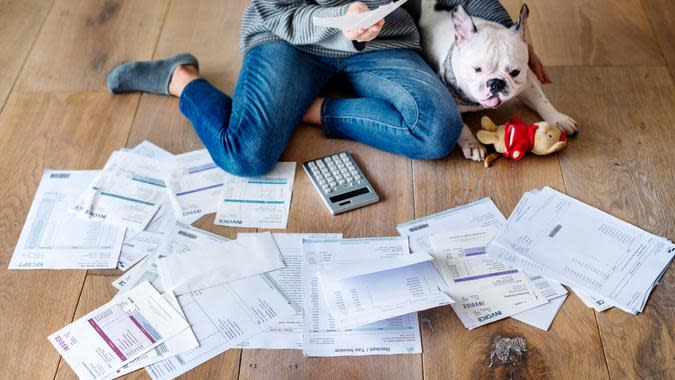Let’s face it, filing taxes can be a huge pain. Receipts can get lost in a year’s time, you might misunderstand filing rules and there’s always the latent fear of a single digit impacting your entire return.
Find Out: How Rich Is Kevin McCarthy?
Related: 3 Ways Smart People Save Money When Filing Their Taxes
Explore: Your Biggest Money Etiquette Questions Answered
Enter tax preparers, professionals who’ve made careers in preparing others’ tax returns. These individuals provide an alternative to both filing on your own and using tax preparation software. Although there are costs and planning involved in using such a service, there are plenty of reasons to consider getting in touch with your local tax prep professional, which include certified public accountants. See if this is an option for you and know which documents you’ll need to provide to a tax preparer.
When Should You Use a Tax Preparer?
Tax preparation is a great option for anyone who doesn’t want to deal with the hassle of taxes, but there are some situations where using a preparer sounds less like an option and more like a mandatory step. Jeff Rose, CEO and founder of Good Financial Cents, recommends these scenarios as times to seek out professional help:You own, sold or started a business
Have many investment losses or gains
Capital asset transactions
Real estate transactions
Change in marital status
Your income and residence are not in the same state or country
Trust Fund Transactions
Completing a Schedule for Self-Employment Income
The reason he recommends a tax preparer for these scenarios is because these situations change what applies to you as a taxpayer based on the federal tax code, which in turn affects your return.Take Our Poll: If Elon Musk Offered You a Job Paying You More Than You Make Today, Would You Work for Him?
What Should You Ask a Potential Tax Preparer?
Before entrusting your finances with someone else, you need to be assured they’re legit. Here are some questions to keep in mind when choosing a tax preparer:Do you have a PTIN (Preparer Tax Identification Number)?
What is your tax background?
What taxes do you specialize in?
Do you know state and local requirements?
When will I receive a copy of my return?
How are your fees determined?
How will I receive my refund?
How the tax preparer handles these questions could also be indicative of their temperament. Don’t be afraid to shop around for different tax preparers if these questions present difficulty for your preparer to answer.
Red Flags To Watch Out For
Is your tax preparer set to fleece you out of your potential earnings? There are definitely signs you can pick up on. Does the tax return they promise you sound suspiciously high? Furthermore, is their pay based upon a percentage of the projected return? To help you weed out the wonks, here are some of the tips the IRS recommends to avoid fraudsters:Check the preparer’s qualifications using the IRS Directory of Federal Tax Return Preparers with Credentials and Select Qualifications.
Check the preparer’s history by asking the Better Business Bureau about them. You can also check for disciplinary actions and the license status for credentialed preparers. For your tax CPA, you might want to reference the State Board of Accountancy for legitimacy. Tax attorneys can be checked against the State Bar Association.
Inquire if the preparer offers IRS e-file and ask to e-file the tax return. Besides being one of the “safest and most accurate ways to file a return,” according to the IRS, paid preparers who do taxes for more than 10 clients generally must file electronically.
Never sign a blank return and avoid tax preparers who request you do so.
Be especially wary if you’re an elderly or low-income taxpayer, as those are the usual targets of scammers. You can report abusive preparers using Form 14157.
Experience Might Lead To a Bigger Return
Tax preparers have a wealth of information that you might not ever be able to tap into. What this means is that a seasoned tax preparer can find potential tax credits or deductions that you would’ve otherwise missed. This becomes especially important for people with more complicated tax forms, such as freelancers or those with an expansive investment or real estate portfolio. Some of the most commonly missed deductions include charitable contributions, tuition and fees deductions and earned income tax credit.
You Can Deduct Preparation Fees
Although tax preparation will cost you, that cost can be deducted from your taxable income. The kicker is that the fees are deducted from the year you pay them, not for the return you’re filing. For example, you would deduct the 2023 fees paid to prepare your 2022 return on your 2023 tax forms. On that note, the average fee for basic tax form preparation is about $220, according to Ramsey Solutions. That fee covers a standard 1040 and state return with no itemized deductions. Depending on your needs, the actual cost could be anywhere between $200 and $600.
Tax Preparation Can Save You Money Overall Despite Paying For It
The deductible preparation fees and the uncovering of missed deductions or credits translate into the filer saving more money overall. Deduction maximization ensures you’re taxed less on your income. Although there are tons of self-filing tax software options, it’s not a guarantee the programs will catch everything you can deduct or credit to your tax forms.
Tax Preparation Frees Up More Time
Sure, there are probably people out there who enjoy going over their tax forms, crunching the numbers in triplicate for accuracy, but if you’re reading this article, you’re probably not that person.Taxes can take up a huge chunk of your time. According to the IRS, it should take the average taxpayer 11-13 hours to prepare their taxes. And analysis by the American Action Forum (AAF), a nonprofit that has been tracking the burden of tax-related paperwork since 2017, estimated that Americans spent a total of 6.5 billion hours trying to file their taxes in 2022.You will still need to budget your time accordingly in order to gather the correct documents, but a tax consultant frees up most of that time you would’ve spent staring at paperwork so you can pursue other projects. Time, after all, is money.
Tax Audit Prevention
Although it might be a one-time service, using a tax preparer to file taxes can be thought of as an investment. These are people who’ve devoted their professional lives to catching your mistakes, mistakes that could severely cost you down the line. A tax audit could cost you as much as $10,000, according to Forbes. These audits more commonly affect companies or wealthier taxpayers, but you could still find yourself at risk depending on how pristine your tax history has been.A tax preparer helps alleviate that worry, providing consistency and accuracy to your books in the process.
How Can I Help My Tax Preparer?
Yes, your tax preparer is there to help you, but you can optimize their service by making sure they’ve got everything they need to go through your taxes. Here’s how to accommodate your tax preparer’s needs, according to U.S. News.Organize your documents: This makes it easier to process your tax information.
Give all your documents over at once: It’s best if your tax preparer has all the information at once for their own organizational purposes and peace of mind. Plus, turning in late documents can ruin their calculations.
Communicate: Talk to your tax preparer throughout the year, keeping them afloat of any changes to your tax status, particularly life changes such as marriage or death. This also applies to signing contracts involving real estate or investments.
Turn in your paperwork early: Tax preparers love getting documents in early, with February being the preferred month, although the first half of March is fine too. Any later than that, though, and you run the risk of stressing out your tax preparer.
What Documents Do I Need?
Ok, so you’ve established rapport with your tax preparer, now to actually give them the tools they need to work with. For starters, always bring your Social Security card to whoever is filing your taxes. This is so they can verify both your Social Security number and the spelling of your name. You will also need your bank account and routing numbers so the government knows where to send your refund if you qualify for one. Here’s a breakdown of the types of documents you’ll need to provide your tax preparer with, along with some examples.Income InformationW-2 Forms from all employers you (and your spouse, if filing a joint return) worked for during the past tax year.
1099 Forms if you (or your spouse) completed contract work and earned more than $600.
Investment income information (including: interest income, dividend income, proceeds from the sale of bonds or stocks, and income from foreign investments).
Income from local and state tax refunds from the prior year.
Business income (accounting records for any business that you own)
Unemployment income
Rental property income
Social Security benefits
Miscellaneous income (including: jury duty, lottery and gambling winnings, Form 1099-MISC for prizes and awards, and Form 1099-MSA for distributions from medical savings accounts)
Income AdjustmentsHomebuyer tax credit
Green energy credits
IRA contributions
Mortgage interest
Student loan interest
Medical Savings Account (MSA) contributions
Self-employed health insurance
Moving expenses
Credits and DeductionsEducation costs
Child care costs
Adoption costs
Earned income credit
Charitable contributions, donations
Casualty and theft losses
Qualified business expenses
Medical expenses
Job and moving expenses
Types of Documents
It can be a pain to remember what all those forms mean, and you certainly don’t want to mix up income and expenses. This can be especially troublesome for independent contractors, freelancers or others who are self-employed and need to file 1099 forms. Below is a list of the most common tax documents you’ll encounter and what they signify.Income DocumentsForm W-2 (wage and salary income)
Form W-2G (gambling winnings)
Form 1099-A (foreclosure of a home)
Form 1099-B (sales of stock, bonds or other investments)
Form 1099-C (canceled debts)
Form 1099-DIV (dividends)
Form 1099-G (state tax refunds and unemployment compensation)
Form 1099-INT (interest income)
Form 1099-K (business or rental income processed by third-party networks)
Form 1099-LTC (benefits received from a long-term care policy)
Form 1099-MISC (self-employment and other various types of income)
Form 1099-OID (original issue discount on bonds)
Form 1099-PATR (patronage dividends)
Form 1099-Q (distributions from an education savings plan)
Form 1099-QA (distributions from an ABLE account)
Form 1099-R (distributions from individual retirement accounts, 401k plans and other types of retirement savings plans)
Form 1099-S (proceeds from the sale of real estate)
Form 1099-SA (distributions from health savings accounts)
Form SSA-1099 (Social Security benefits)
Form RRB-1099 (Railroad retirement benefits)
Schedule K-1 (income from partnerships, S corporations, estates or trusts)
Expense DocumentsForm 1097-BTC (bond tax credit)
Form 1098 (mortgage interest)
Form 1098-C (charitable contribution of vehicles)
Form 1098-E (student loan interest)
Form 1098-MA (homeowner mortgage payments)
Form 1098-T (tuition for higher education)
Please note these lists are incomplete and might not reflect your tax situation or documentation. Using a tax preparer is a great way to achieve peace of mind for an otherwise stressful task. Be sure to consider how using a tax preparer will impact you financially and personally, and always remember to shop around for quotes.More From GOBankingRates6 Types of Retirement Income That Aren’t Taxable
8 Travel Accessories Buyers Never Regret
The 10 Best Rewards Credit Cards for 2023
How Many Credit Cards Should You Have? Experts Weigh In
This article originally appeared on GOBankingRates.com: Why You Should Line Up a Tax Preparer Now — and What Paperwork You’ll Need
Source: Read Full Article











